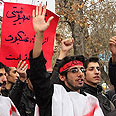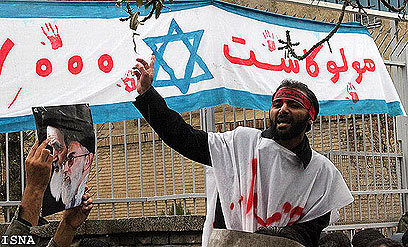
Iranian students threaten to destroy Esther's tomb
Protestors in Hamadan warn 'Zionist leaders' they'll 'destroy lowly murderers' mausoleum if Al-Aqsa mosque assaulted in any way'
According to tradition, the tomb is located in the western Iranian city of Hamadan.
The students, who rallied at Bu-Ali Sina University in Hamadan, said in a statement, "We, the student basijis... warn Zionist regime leaders if they assault the Al-Aqsa mosque in any way we will destroy the tomb of these lowly murderers."
Iranian news agencies said the protestors are members of the student basij, or hardline Islamist militia.

Israeli flag with word 'Holocaust' on it during Sunday's rally in Hamadan
The shrine in Hamadan commemorates Esther, a young Jewish woman who married Achaemenid King Xerxes five centuries before Christ, and convinced him to allow Jews to settle freely in the Persian empire.
Iran has the largest Jewish community in the Middle East -- 20,000 to 25,000 by different estimates -- after Israel, and the shrine is visited by many pilgrims every year.
Iran also houses in the western town of Shush the tomb of Jewish prophet Daniel, who according to biblical tradition, survived the lions' den.
The Islamic republic does not recognize Israel and hard-line President Mahmoud Ahmadinejad has drawn international condemnation by his vitriolic attacks against the Jewish state and his dismissal of the Holocaust as a "myth."
Several construction and archaeological projects around Al-Aqsa mosque, known to Jews as the Temple Mount and to Muslims as the Haram al-Sharif or Noble Sanctuary, have raised charges from the Muslim world that Israel is endangering the sacred site.
Construction or renovation projects in and around the Old City are deeply controversial and have often sparked violence in the past.
Al-Aqsa mosque compound is Islam's third-holiest site, after Mecca and Medina, and is the place where Muslims believe the Prophet Mohammed made a night journey to heaven on horseback.
It is the holiest site in the world for Jews, who believe it was the location of the Second Temple, torched by the Romans in 70 AD.
AFP contributed to the report
- Follow Ynetnews on Facebook










